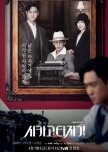A Quiet, Eerie Love Letter to Those Erased by Time
Some stories demand to be heard.
Others whisper — soft, persistent, inevitable — until you realize they were never meant to be forgotten at all.
Chicago Typewriter is one of those rare stories.
At first glance, it feels deceptively simple: a stylish, slightly eccentric tale of writers bound together across lifetimes. There’s humor, warmth, even a hint of fantasy romance.
But if you listen carefully, you’ll realize it’s doing something far more unusual — and far more haunting.
Where most dramas romanticize writers as artists chasing inspiration, Chicago Typewriter treats writing as an act of haunting — a debt to history, a responsibility to lives that never had their stories told.
It moves between 1930s resistance-era Seoul and modern-day life without heavy exposition; the past isn't recounted. It's relived.
The memories come not as grand narratives, but as flashes — moments so immediate and alive that they make it impossible to pretend time has closed the wounds.
It’s not about reincarnation as destined romance.
It’s about unfinished loyalty.
Unfinished responsibility.
Unfinished courage.
Chicago Typewriter is a story about invisible lives — those who fought, resisted, loved, and were forgotten. It’s a quiet, eerie love letter to them. A promise that even if history erased their names, their sacrifices still echo through time, through words, through memory.
In a world that increasingly demands louder, faster, more shocking storytelling, Chicago Typewriter dares to move differently.
It trusts silence.
It trusts that grief can be inherited.
It trusts that redemption doesn’t always come from grand acts, but sometimes from remembering — truly remembering — those who were left behind.
This isn’t a drama that screams for your attention.
It’s a drama that earns your memory.
Others whisper — soft, persistent, inevitable — until you realize they were never meant to be forgotten at all.
Chicago Typewriter is one of those rare stories.
At first glance, it feels deceptively simple: a stylish, slightly eccentric tale of writers bound together across lifetimes. There’s humor, warmth, even a hint of fantasy romance.
But if you listen carefully, you’ll realize it’s doing something far more unusual — and far more haunting.
Where most dramas romanticize writers as artists chasing inspiration, Chicago Typewriter treats writing as an act of haunting — a debt to history, a responsibility to lives that never had their stories told.
It moves between 1930s resistance-era Seoul and modern-day life without heavy exposition; the past isn't recounted. It's relived.
The memories come not as grand narratives, but as flashes — moments so immediate and alive that they make it impossible to pretend time has closed the wounds.
It’s not about reincarnation as destined romance.
It’s about unfinished loyalty.
Unfinished responsibility.
Unfinished courage.
Chicago Typewriter is a story about invisible lives — those who fought, resisted, loved, and were forgotten. It’s a quiet, eerie love letter to them. A promise that even if history erased their names, their sacrifices still echo through time, through words, through memory.
In a world that increasingly demands louder, faster, more shocking storytelling, Chicago Typewriter dares to move differently.
It trusts silence.
It trusts that grief can be inherited.
It trusts that redemption doesn’t always come from grand acts, but sometimes from remembering — truly remembering — those who were left behind.
This isn’t a drama that screams for your attention.
It’s a drama that earns your memory.
Was this review helpful to you?







